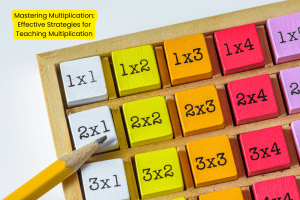Students of all ages have always been fascinated and anxious about the topic of mathematics since it is the universal language of numbers, forms, and patterns. While some people like the logical problems that arithmetic brings, others struggle with math anxiety, a crippling phobia. Their inability to perform effectively on math-related activities may be hampered by this fear, which can result in a vicious cycle of avoidance and diminished confidence. But do not worry; overcoming math phobia is not an impossible challenge. Anyone can get through this barrier and have a more positive connection with mathematics with the correct approaches and mentality.
Understanding Math Anxiety
Numerous people endure increased tension and worry when faced with arithmetic-related activities due to the psychological condition known as math anxiety. It’s critical to understand that math anxiety is not a sign of one’s ability or intelligence. In contrast, it results from a variety of factors, such as traumatic prior experiences, social pressures, and peer comparisons. These elements come together to produce an omnipresent feeling of discomfort, which is frequently accompanied by physical symptoms like a faster heartbeat, perspiration, and brain blockages when doing arithmetic problems.
Negative Experiences: Previous maths difficulties, such a hard time grasping a given idea or a poor test score, can leave emotional scars. These situations can undermine self-assurance and leave a long-lasting link between maths and worry.
Societal Expectations: Unintentionally, the way society views maths can cause worry. The idea that maths is fundamentally difficult or appropriate for just a small set of people might put up a mental barrier. The pressure to meet these standards might make poor performance become a self-fulfilling prophecy.
Peer Comparisons: Comparing oneself to colleagues who appear to be math experts might make one feel more inadequate. People who have a comparison mindset may experience increased anxiety because they feel pressure to live up to expectations.
Embrace a Growth Mindset
Adopting a growth mindset, a notion popularised by psychologist Carol Dweck, is a potent method for overcoming arithmetic phobia. A growth mindset is fundamentally the idea that aptitude and intellect are not fixed qualities but may be enhanced through commitment, education, and effort. Adopting this perspective can have a profound impact on how people tackle math-related problems.
Effort and Learning: People who have a growth mindset are aware that improvement requires ongoing effort and learning. As a result, maths issues are approached with a proactive mindset since each obstacle is seen as a chance for growth rather than as a test of innate ability.
Taking on Challenges: People with a development mindset welcome challenging maths issues rather than avoiding them. Challenges are viewed as stepping stones on the path to mastery, and the act of struggling with difficult ideas is recognised as a crucial stage in the learning process.
Resilience: In the face of setbacks, resilience is fostered by a development attitude. People view mistakes and initial problems as transitory roadblocks on the way to development rather than becoming demoralised by them. By being resilient, one may withstand the damaging emotional effects of failure.
Positive Feedback Loop: People with a growth mindset get more confident as they make progress. Each minor triumph serves to support the notion that effort improves performance, establishing a positive feedback cycle that boosts confidence even more.
Start Small and Build Confidence
The key to overcoming arithmetic phobia is to be methodical and persistent. Starting small and gradually increasing your confidence is a good tactic. You may acclimatise yourself to mathematics in a more favourable way by taking little steps and creating attainable goals.
Comfort Zone: Start with choosing arithmetic problems that are just a little beyond of your present comfort zone. You are convinced that you can tackle these issues without feeling overburdened. Setting the stage for a sense of accomplishment by beginning with chores within your ability.
Gradual Progress: As your confidence grows, progressively raise the level of difficulty of the issues you take on. You may adjust to increasing difficulty levels while preserving your sensation of success by moving from easier issues to somewhat more difficult ones.
Celebrate Your Successes: Honour each little success you achieve along the road. It is important to recognise and rejoice when a task is completed, a new idea is grasped, or a hurdle is overcome. This affirmation of your abilities to learn maths strengthens that belief.
Positive Reinforcement: Dopamine, a neurotransmitter linked to motivation and pleasure, is released by the act of celebrating your accomplishments, which activates the brain’s reward system. You will be more inclined to approach future maths problems with excitement as a result of this, which strengthens the favourable relationship with maths.
Practice Regularly
In order to overcome arithmetic anxiety, the proverb “practise makes perfect” is very relevant. Regular practise not only improves your mathematics abilities but is crucial in lowering the tension that math-related activities might cause.
Consistency: Allocate a specific period of time each day to practise maths. Building expertise and confidence requires consistency. Regular practice, whether for 10 minutes or an hour, strengthens your resolve to get better.
Anxiety Desensitization: Math difficulties are repeatedly exposed to help desensitise your mind to the cues that cause anxiety. The initial dread and uncertainty vanish as you regularly participate in maths exercises, enabling you to approach problems with a more clear-headed mentality.
Incremental Improvement: You’ll gradually see your maths skills get better. Math anxiety may be effectively treated with a sense of success and improvement since it shows that you are capable of overcoming obstacles.
Seek Understanding, Not Perfection
In mathematics, understanding the fundamental ideas and methods is more important than consistently producing perfect solutions. Maths can be approached differently if your goal is to gain a thorough grasp of the material rather than to achieve perfection.
Conceptual Understanding: Prioritise comprehending how and why a specific solution functions rather than focusing only on the right response. By using this method, you may create a strong foundation that can be used to solve a variety of arithmetic issues.
Learning from Mistakes: Embrace errors as wonderful learning opportunities by learning from them. Take the time to consider what went wrong and why when you make a mistake. Your problem-solving abilities will be enhanced as a result of this introspection, which also strengthens the growth mentality that mistakes are opportunities for progress.
Lessening Pressure: You lessen the pressure associated with getting everything perfectly by changing the emphasis from perfection to comprehension. This mental shift encourages a looser approach to maths, which in turn lowers anxiety.
Break Down Complex Problems
Many people experience arithmetic anxiety when faced with challenging math tasks because they find them daunting. This obstacle may be addressed, though, by breaking these complex issues down into smaller, more manageable stages.
Decomposition: Complex mathematical problems sometimes include several parts or subproblems. Start by identifying these smaller components and taking care of each one separately. This strategy not only makes the work simpler but also avoids feeling too overwhelmed.
Step-by-Step Approach: After you’ve separated the issue into its constituent parts, solve each one separately. By concentrating on the details of each stage, work up to the full answer gradually. This methodical technique offers a simple road map to follow, reducing uncertainty and stress.
Sense of Achievement: You’ll feel a sense of accomplishment as you successfully complete each phase. By completing these modest tasks, you may demonstrate your ability and lessen the stress that comes with taking on a seemingly impossible task.
Visualize Success
By altering your brain’s reaction to stressful events, visualisation is a powerful mental tool that can help you overcome math anxiety. Visualise yourself tackling arithmetic problems with assurance while remaining composed and in control.
Mental Rehearsal: Close your eyes and mentally practise doing complex mathematical operations. Imagine yourself addressing issues in a calm manner, remembering pertinent ideas, and effortlessly coming up with answers. This mental practice aids in creating a favourable mental connection with situations involving maths.
Positive Emotions: Visualisation causes the release of neurotransmitters linked to positive emotions in the brain’s reward centres. With practice, this strategy may replace worry with a sense of capacity and mastery when it comes to situations involving maths.
Regular Practise: Set aside a few minutes every day to practise visualisation. Your brain will eventually become more sensitive to the constructive picture you produce, making it an effective tool for reducing arithmetic anxiety.
A growth attitude, systematic problem-solving, visualisation of achievement, use of resources, regular practise, prioritising understanding, stress management, and recognising progress are all necessary for navigating the route to overcoming math phobia. By combining these strategies, arithmetic worry may be transformed into a platform for improvement and self-assurance. With these techniques at your disposal, you may rethink your connection to mathematics and set out on a transformational quest for mastery and newly discovered confidence in numerical research.






